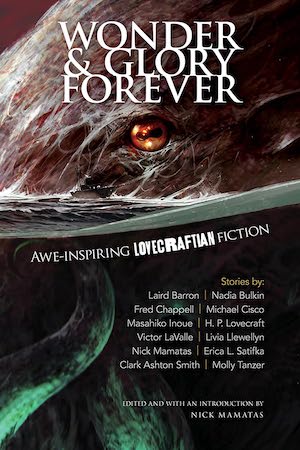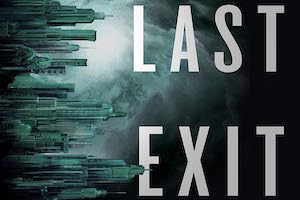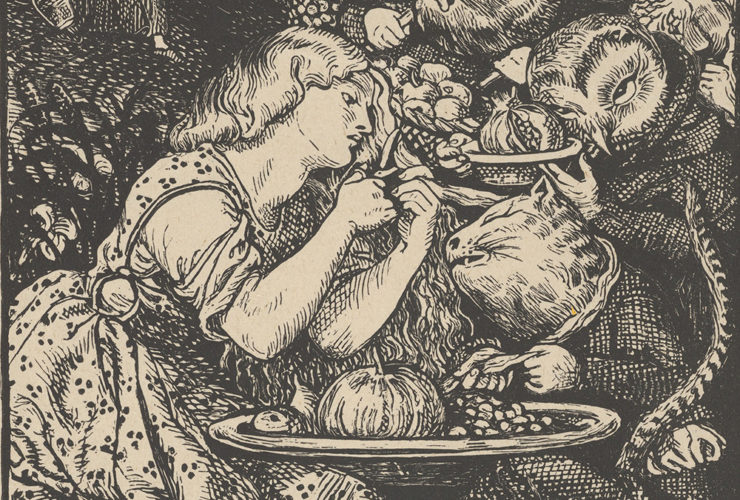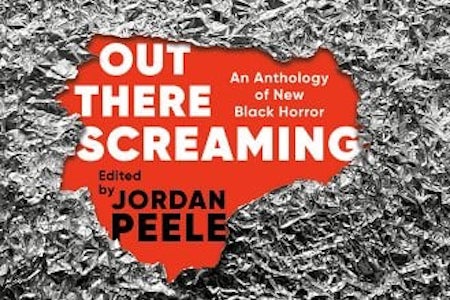Welcome back to Reading the Weird, in which we get girl cooties all over weird fiction, cosmic horror, and Lovecraftiana—from its historical roots through its most recent branches.
This week, we cover Nadia Bulkin’s “Seven Minutes in Heaven,” first published in Aickman’s Heirs in 2015—you can find it most easily in Nick Mamatas’s Wonder and Glory Forever anthology. Spoilers ahead!
Summary
“Memento Mori. I remembered.”
Amanda lives in Hartbury, one of two towns on Mt. Halberk. The other, Manfield, is a ghost town whose steeple, water tower and municipal dome peek above the trees when you drive down Highway 51. A long time ago, there was an accident at Manfield’s chemical factory which released a cloud of pesticide gas, killing all its inhabitants. Amanda won’t learn this story until junior high—young Amanda imagines God crying “away with you sinners” and waking extinct Mt. Halberk to exact His vengeance. A “morbid” child, she soothes her anxieties by drawing pictures of Manfield complete with stick-figure people and animals. Then she draws the volcano pouring black Sharpie curlicues of destruction down on the town. On Manfield—not on Hartbury, not on her.
Amanda’s friend Jennifer is afraid of ice cream trucks. Amanda’s phobia is less whimsical: She’s afraid of skeletons, because they make her think about “what waited for [her] on the other side.” Pastor Joel tells her that Heaven will hold no ugliness or suffering, and besides, it will be a long time before she’s ready to go. Well and good, but his reassurances can’t banish the under-the-bed skeleton that emerges to clamp rotten fingerbones around her neck. It takes her teacher Miss Lucy to exorcize the nightmares, Miss Lucy so loves Halloween that she hangs a skeleton decal from the classroom American flag. She tells Amanda that she shouldn’t fear skeletons, given she already has one inside her. Parents don’t like Miss Lucy. She’s replaced by Mrs. Joan, who doesn’t like Halloween.
At seventeen, Amanda makes her first visit to Manfield with friends—a “hardcore” way to celebrate Halloween. Their vision of an Old West ghost town is far from the truth. With its “ticky-tacky houses and plastic lawn gnomes and busted minivans,” Manfield looks “just like Hartbury—only dead.” Allie’s surprised to see that the newspaper clippings taped in a tavern window are only twelve years old. Parents have been vague about the chronological distance of the disaster, stating it was “a while ago.” “A while,” Amanda thinks, is one of those “slipshod words that you could rearrange to cover up the fact that somewhere, somebody was wrong.”
Amanda goes out of town to college, where her most critical lesson comes from an anthropology-obsessed roommate, who’s reading a book called A History of Forgotten Christianity. One chapter’s on cults of universal resurrection. Around 350 such communities sprouted in Northeastern America, mostly in small towns subject to high mortality rates. The cultists believed God had granted them the power to raise the dead. Pastors and elders could perform a ritual immediately postmortem to prevent the soul from leaving. Two details chill Amanda. The cult’s symbol was the scarab beetle, whose offspring emerge from balls of dung—like the stained-glass windows in her home church. And most universal resurrection cults eventually converted to mainstream Christianity. Most, but not all.
Amanda leaves college and goes to the city. She’s known that the toxic cloud that destroyed Manfield did blow toward Hartbury; she’s assumed it never got there. Now she’s convinced Hartbury’s home to the walking dead. She estranges herself from her family and substitutes for them “Brother Whiskey and Sister Vodka.”
At twenty-three, she returns home for her aunt’s funeral. Her parents are frightened by the tattoos of bones she wears by way of memento mori. They’re appalled when she reacts with hysterical terror and laughter to Pastor Joel’s funeral oration: O death where is thy sting? Her father accuses her of having no respect for the life her town’s given her, while she counters he has no respect for death. Why doesn’t he bring Aunt Ruth back to life if he loves it so much? Her father answers that Aunt Ruth was ready to go. Ready this time.
Amanda returns to Manfield, alone except for the family dog Buttons. The ghost town looks more dilapidated now, but she follows a new group of thrill-seeking teenagers. One guy mentions the neighboring town that also got gassed but survived. His mother was a 911 operator who got a flood of calls from Hartbury. When rescue workers arrived, they were told everyone was fine.
Amanda roams again, through a world succumbing to plagues and war and martial law. She gets sober but keeps moving. On a bus trip in “the dead of summer,” her own skeleton returns to her, “its agony…so much deeper, that much richer…grown up.” She tells a fellow passenger, an old man with rotting teeth, about Hartbury and confides a secret: She died there. He grins and says, “Join the club, living dead girl.”
On her third visit to Manfield, Amanda finds nature reclaiming it. But still there are thrill-seeking teenagers. She hides and eavesdrops. One recounts a story from a friend-of-a-friend: the town’s haunted by a girl with a dog. So Buttons is going to live forever, unlike the FOAF who was deployed and died. “Everyone was dead,” Amanda concludes. “Everyone was alive.” And a fighter jet roars overhead, “on time for its appointment with the grim reaper.”
Libronomicon: Narrator’s college roommate quotes to her from A History of Forgotten Christianity, sharing unwanted information about the sect in which she grew up (or went through some semblance of growing up).
Madness Takes Its Toll: The narrator describes herself growing “older and madder”; it’s entirely unclear which meaning of “mad” she intends.
Ruthanna’s Commentary
The world is off its track. Something happened that wasn’t supposed to happen, or something didn’t happen that was supposed to. And with one thing off-track, everything goes sideways and keeps going, stranger and stranger and worse and worse, a katamari damarcy runaway trolley of wrongness. It is, maybe, a familiar feeling.
Nadia Bulkin is a long-time Reading the Weird favorite—this is the least bloody of her pieces we’ve covered so far, and also maybe the creepiest.
I read a story in my teens—here it is, wow, I didn’t expect to find it!—in which a man is given a book by a street preacher entitled You Will Never Die. The book’s message is not so hopeful as one might presume from the title: it suggests that in a multiverse of infinite possibilities, where new realities split off with each decision and dice roll, every individual consciousness will follow the track of possibility in which its existence continues. If you get hit by a runaway trolley, you’ll wake in a world where the trolley was sideswiped by a bus just before it hit you, saving your life and destroying others. The longer your consciousness goes on, of course, the stranger and more unlikely the world around you becomes—depending, as it does, on the increasingly wild events required for your personal survival. The narrator ends up the last survivor of Earth, being “salvaged” by aliens via…maybe you should just go read, I’m not sure I can adequately summarize it. It’s all very unpleasant and exactly as strange as you’d expect from Robert Charles Wilson.
“Seven Minutes in Heaven” feels of a piece with that story. Something is off-kilter right at the beginning, and the world gets worse and stranger as it goes. It’s never quite labeled as an alternate history—but the narrator’s survival requires Christ the Worm and Christ the Scarab, requires resurrectionist priests and a seven minute refund period on death. Perhaps it also required the Pacific Wars and broken highways, survivors of some further unspecified war murdering each other beside buses. I’m reminded again of another story, this time Ursula Le Guin’s The Lathe of Heaven, where a therapist manipulates a patient who can dream changes into reality, trying to make the world better and succeeding only in painting humanity into ever-worse corners.
Which brings us back to Last Exit, and the question of whether a better reality is findable, and if so what it takes to get there from a local maxima surrounded by chasms of dystopia.
I don’t think the narrator of this story is going to get past those chasms, somehow. If half-life can be pulled from death, then life grows increasingly meaningless, and decisions (perhaps to go to war and launch angelic war planes) become increasingly made by the half-alive who refuse to acknowledge what they’ve done. The resurrection of Hartbury might have gone very differently if not accompanied by the insistence that everything is fine, that Mansfield died decades ago, that history was never different and couldn’t ever have been different. Lies, like violations of natural law, multiply and run out of control, until truth and lie—like life and death—can no longer be distinguished, and one can’t be preferred over the other.
One subtle horror, among the many obvious ones, is how the resurrected Hartburians lose the solace of irrational phobia. In our world, a child with nightmares about skeletons or the sea can be reassured that dreams aren’t real and fear can attach to anything. But here’s poor Jennifer Trudeau and her freak ice cream truck accident—perhaps waking in a worse and stranger reality with her head attached to an alien robot? Or her brain in a jar on its way past Yuggoth?
That may be the worst possibility. In a world where “everyone was dead; everyone was alive,” there’s no particular expectation that well-meaning priests—even ones capable of mass resurrection—are right about the other options at the end of that seven-minute waiting period. The narrator recalls only darkness in her memento mori. Maybe there’s no heaven for the solidly dead after all. Maybe there are just increasingly fractional states of living, in ever-increasing states of uncertainty, far from the track where the world started.
Anne’s Commentary
I can sympathize with Amanda’s compulsion to draw pictures of Manfield and its volcanic destruction. Putting the tormenting image down on paper is the only way she can get it out of her head and remind herself it was Manfield that incurred the wrath of God, not Hartbury. When I was in early grade school, I overheard my mother talking about some kid who got lookeemia and died. My takeaway was that kids were especially susceptible to lookeemia and always died from it. Always, because what it was, your heart was normally half-red and half-white, but sometimes the white half started eating the red half until the heart was all white, and then forget about it, the worms would soon be crawling in and out, like the song said. I’d barely gotten over thinking I’d get leprosy like guys in Bible stories and have to totter around noseless with a bell around my neck. Now I drew page after page of cartoons in which normal hearts went lethally bleached. The last frame was a skull with X’s instead of eye sockets.
Not that I was a morbid child or anything. I was quite cheerful after drawing the hearts, because it was never my heart in the cartoon but that of some kid too dumb to ward off lookeemia via the magic of art.
I had to look up this Seven Minutes in Heaven game. Also the concept that it takes seven minutes for the soul to journey to paradise. Eventually Amanda learns that the name doesn’t refer to a variation of freeze-tag, but to a party game popular with teens. In the party game, two of the players go together into a closet or similar tight, dark space and stay there for seven minutes, chatting or kissing or making out, name your level of intimacy. Being an inveterate eavesdropper, Amanda might have heard some teens talking about Seven Minutes; caught, they might have come up with the freeze-tag story. Or she might have asked adults about the game, and gotten the embarrassed fib. Those who were adults when the Manfield factory belched death are used to telling face- and/or sanity-saving lies to their children.
The truth was that Manfield’s wind-wafted poison-cloud entered Hartbury attenuated enough not to kill everyone before Parson Joel and associates had time to revivify the stricken. I bet the Manfield people used to shake their heads about those scarab-worshiping Hartbury folk, but the cosmic laugh was on them when the Universal Resurrectionists had just the right disaster plan in place.
Or… did they?
In addition to discovering the true nature of the Seven Minutes game, Amanda realizes that seven minutes isn’t the length of time it takes for a soul to reach heaven. I tried to figure out where she got this notion. Unsurprisingly, I could track down no consensus on the theological question. Some suppose the soul transitions to the afterlife at death. Others suppose the soul remains in a transitional state for varying lengths of time, like the forty-nine days Tibetan Buddhists believe a soul lingers in the bardo before rebirth. Some Biblical passages contend that nobody goes to heaven instantly, but must “sleep” until the Second Coming, as in John 5: 28-29:
For the hour is coming in which all who are in the graves will hear His voice and come forth—those who have done good, to the resurrection of life, and those who have done evil, to the resurrection of condemnation.
In 1 Thessalonians 4: 13-15, Paul tells the dozing dead not to worry that the wide-awake will beat them to the Throne of Judgment: “We who are alive and remain until the coming of the Lord will by no means precede those who are asleep.”
This may reassure most of us, but what about those resurrected not by divine trumpets but by potentially criminal necromancy? Pastor Joel, I’m looking at you. I’m sure you meant well, but in legend and weird fiction, usurping godly powers rarely ends well. Can living dead girls hope to join the existentially pure on the Last Day? Is their only salvation finally choosing to die and stay dead, like Aunt Rose? Bulkin doesn’t say, but are the Universally Resurrected immortal? Amanda evades many mortal perils in the apocalyptic times of her maturity: plague, war, people who’ll kill you for the stale Kind Bars in your backpack.
To consider Amanda’s situation from a more philosophical, perhaps ecological standpoint: Can one respect life without respecting death? This is an argument Amanda has with her father when he accuses her of not valuing what Universal Resurrection has given her.
Amanda has plenty of memento mori, “the shadows of nearly all [her] bones…tattooed across [her] body.” She, however, doesn’t have to remember she must die—she already has died, as she tells the old man on the bus. He says to join the club, which probably doesn’t mean he’s also Universally Resurrected, although that would be cool. Everyone is dead, everyone is alive. That’s the epiphany Amanda takes away from her last visit to Manfield.
In the midst of life, we are in death. Figuratively true for all. Actually true for Amanda. Is it any wonder if she’s a bit morbid?
Next week, maybe we finally learn about Elsinore? Maybe, in chapters 25-26 of Max Gladstone’s Last Exit.













